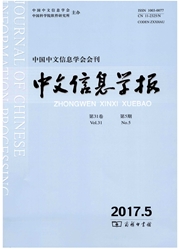

 中文摘要:
中文摘要:
本文首先讨论语义角色的三种精细程度不一的分类层级,介绍它们各自在语言信息处理系统中的有关应用。接着,分别介绍三种为语言信息处理服务的语义资源对于语义角色的不同处理:(i)加州大学伯克利分校框架网的语义角色——基于场景的语义框架中的框架元素;(ii)宾州大学命题库的语义角色——基于特定动词的编了号的原型角色;(iii)北京大学中文网库的语义角色——基于特定谓词的各论元成分的论旨角色。最后,从建库目标、方法论、标注内容和系统构成等方面,比较这三个语义关系标注语料库的同异。
 英文摘要:
英文摘要:
This paper firstly discusses three kinds of level in the fineness hierarchy of semantic roles, and introduces their application in some systems of natural language processing (NPL). Then it introduces three approaches to treat semantic roles in three semantic resources for NPL: (i) the frame elements in the semantic frame which is situation based the semantic roles in the FramNet of California University at Berkeley; (ii) the numbered pro-typical arguments which is special verb based -- the semantic roles in the PropBank of Pennsylvania University; (iii) the thematic roles of arguments which is special predicate (verb or adjective) based -- the semantic roles in the NetBank of Peking University. Finally, these three semantic resources (i. e., annotation corpora) are compared from their goals, methodologies, annotation contents and constitutions.
 同期刊论文项目
同期刊论文项目
 同项目期刊论文
同项目期刊论文
 期刊信息
期刊信息
